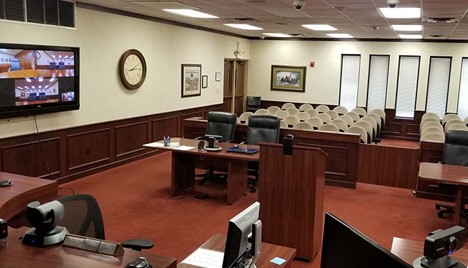The global coronavirus pandemic has and continues to have a profound effect on the way we do business, interact with others socially, and even how we conduct court cases, especially in the area of expert witnesses.
In the past, the preferred method for this type of testimony was to fly the experts in, prep them for a day or two, and have them testify. They were not considered to be “experts” until the judge and jury could see them, and each side could grill their credentials.
Since March, all of that has been tossed on its head. Depending on the state and case, expert witnesses have been eliminated or reduced for months. However, because there is no definitive end date to COVID-19 and many states are concerned about the escalating rates of this disease, remote appearances are taking shape, and judges are warming up to this way of testimony.
Courts and Coronavirus
During this time of COVID-19, U.S. federal and state courts are taking various measures, including restricting visitors to court buildings, canceling or deferring hearings, and conducting only essential matters face-to-face.
One of the measures being adopted by courts to limit the risk of spreading the virus includes encouraging or requiring more effective use of videoconferencing in place of face-to-face hearings. There are many benefits to using this technology, including:
- sparing the time and travel costs of expert witnesses
- making it easier for vulnerable witnesses (including children) to testify from a place where they feel safer or less intimidated and
- For individuals who don’t have transportation, employment, or childcare, it allows for greater flexibility and has proven to increase the number of people who “show up.”
While it has advantages, there are also associated concerns that should not be overlooked. A person’s presence is ‘mediated’ by the technology in ways that make the experience of appearing by videoconference, especially if the bandwidth is slow and the technology is not state-of-the-art in both locations. Here are a few things to consider:
- If the bandwidth is slow, the following could happen:
- Buffering could occur, which most likely will be a distraction to those in the courtroom
- The audio and video will not align
- The connection might be lost, causing several restarts
- Regarding the equipment, older equipment does not have the size, video quality, or sound system to provide a quality connection, which might discount the person’s credibility at the other end. Think of news programs you have recently watched where you see someone on the other end with crisp video and audio contrasted to another where their picture is fuzzy.
Most of these concerns can be addressed by improved technology, including a 4K resolution solution. Some of the benefits of newer technology include:
- Consistent experience across all devices – desktops, tablets, and smartphones
- The cloud-based application is available 24/7 on any device, allowing for connectivity at any location with Wi-Fi
- The ability to have up to 300 live participants
- Full-motion video content
- End-to-end encryption to ensure privacy protection of the parties associated with the court case
Conclusion
Videoconferencing technology plays an essential role in delivering justice in many court systems today. It is a logical step in a pandemic to consider expanding its use to minimize the number of people that need to be brought together in close physical proximity.
The pandemic has “opened our eyes to uses of technology we hadn’t considered,” Rick Klinger, Stow Municipal Court Administrator, stated. “It forced us to think about it and come up with solutions. They’ve turned out to be good short-term fixes and — several of them — long-term fixes.”
Timothy Dimoff is a National Expert Witness
Tim Dimoff is considered one of the nation’s leading authorities in high-risk workplace and human resource issues. He is a nationally recognized expert on violent behavior and criminal investigation. Over the last several years, Tim has traveled all over the United States to testify in cases involving law enforcement and security. He will travel for court cases but is also available via videoconferencing if the court allows it.
Tim also conducts training on How to be an Expert Witness.

